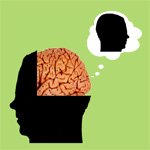 In the previous post, I asked what is the difference between having a painful experience myself and feeling sympathy for someone else’s pain. The answer seems pretty clear. My experience of my own pain is neurologically ‘hard-wired’, but there is no direct neural connection between other persons and myself which exposes me to their pain. Things could have been different. If we, like the Na’vi of the movie Avatar, had the physiological equivalent of USB-ports which allowed us to connect our nervous systems at will, then we could experience the pains, pleasures, and other sensations of other people while we were connected to them. The ‘privacy’ of our minds is an anatomical limitation, not a metaphysical necessity.
In the previous post, I asked what is the difference between having a painful experience myself and feeling sympathy for someone else’s pain. The answer seems pretty clear. My experience of my own pain is neurologically ‘hard-wired’, but there is no direct neural connection between other persons and myself which exposes me to their pain. Things could have been different. If we, like the Na’vi of the movie Avatar, had the physiological equivalent of USB-ports which allowed us to connect our nervous systems at will, then we could experience the pains, pleasures, and other sensations of other people while we were connected to them. The ‘privacy’ of our minds is an anatomical limitation, not a metaphysical necessity.
A parallel question can be asked about future experience. What is the difference between anticipating my own pain and having sympathy for a friend whose pain I can foresee? As in the case of present pain, there is a vivid difference in my experience between anticipating having pain, and expecting you to have pain. There is nothing resembling a direct neural connection between myself, now, and myself in the future, to explain this difference. Nevertheless, neuroscience can help us understand it: why it is so vivid, why expectation of my own pain makes me anxious rather than just sympathetically concerned, why foreseeing pain in my own future feels like an unavoidable problem for me in a way that foreseeing your pain does not.
Another difference is that sympathy for others, unlike self-concern, seems at least partially under conscious control. When we feel we cannot afford it, we tend to dial it down or switch it off altogether. It feels optional, in contrast to the sense of unavoidability that clings to self-concern.
In his book, Hardwired Behaviour, Laurence Tancredi of the New York University School of Medicine offers some clues to an answer from a neurological perspective. The engine of self-concern is a cyclical interaction between the limbic system, which generates our emotions (giving emotional ‘meaning’ to experience), and the prefrontal cortex, which makes plans and decisions. Continue reading “The Neurology of Anticipation”
